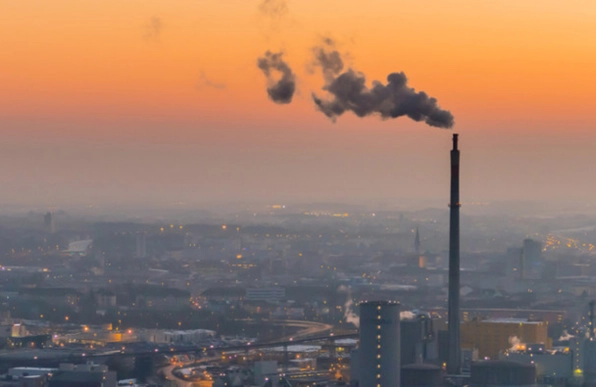The successful bid by Saudi Arabia for the FIFA World Cup in 2034 has stirred much debate all over the world. The country has been making great strides in developing its infrastructure and diversifying its economy through Vision 2030; however, there are critical concerns regarding its suitability for hosting such an event.
Saudi Arabia’s air quality is poor through repeated occurrences of dust storms and urban pollution, exposing this place to severe health impacts on players, spectators, and residents. The article explores why air quality concerns in Saudi Arabia make this country an inappropriate venue to host the world’s grandest football event.
Health Effects of Dust Storms
Saudi Arabia is located in a region known for dust storms. These storms are known as haboobs, which are caused by the dryness of the climate and low vegetation coupled with the winds. They significantly affect the air quality during their occurrence; it raises the concentration levels of particulate matter, especially PM10 and PM2.5, which negatively affects human health. As of late 2020, the average Air Quality Index (AQI) in Saudi Arabia was recorded at 73, which falls under the “Moderate” category according to World Health Organization (WHO) standards.
Effects on Athletes
Such a condition can make the football players underperform or not be at their best. High levels of particulate matter irritate the respiratory system, bringing inflammation and reduction in lung capacity. Longer exposures are sure to bring about much more critical health conditions such as bronchitis and even the exacerbation of asthma. Even to play a game, short exposure could reduce the performance and comfort levels of athletes.
Effect on Viewers
Air Quality: The travel by the fans becomes unhealthy in Saudi Arabia’s air quality the dust storms in the air quality. The health problems that may occur for the fans are itchy eyes, sore throats, or deadly respiratory infections. People prone to such issues include children and the elderly with past illnesses.
Urban Pollution: A Rising Issue
With fast urbanization, there is severe urban pollution. Many air pollutants prevail in the atmosphere of cities such as Riyadh, Jeddah, and Dammam as a result of emissions from vehicles, industrial operations, and construction dust. The most vital sources of air pollution include emissions from vehicles. This accounts for 50% of hydrocarbons. The largest contributors to particulate matter and other pollutants.
Construction Dust
Major construction work on stadiums, hotels, and transportation infrastructure projects will take place as preparatory works in Saudi Arabia before the World Cup. Building activities create fine particles suspended in the air, which further reduces Saudi Arabia’s air quality within the city regions.
Longer-Term Health Risks to Local Population
A great short-term event for most, the long-term effects of health implications on those staying in Saudi are concerning because chronic exposure to poor-quality air can lead to diseases and even potentially premature death. Therefore, hosting the World Cup will likely worsen some health outcomes for residents if these underlying issues are not addressed.
The poor air quality in Saudi Arabia raises even questions about the country’s environmental sustainability initiatives. Hosting the FIFA World Cup requires great commitment to green practices in terms of reductions in emissions, waste management, and developing green infrastructure.
Carbon Footprint of the Event
To host the World Cup to be held in Saudi Arabia shortly, it has welcomed and will welcome millions of foreign visitors to the country, resulting in a huge increase in carbon footprints. Under a normal scenario, this level of event can easily hurt environmental/air quality if no tangible step is taken to recover by increasing the public transport system together with renewable sources of energy.
Comparison with Hosts in the Past
Environmental issues exist with countries that host the World Cup, be it in 2006 like Germany, 2010 South Africa, or the recent one in 2022, Qatar. Nevertheless, the frequency of natural dust storms allied to rapid urbanization heightens air quality issues within Saudi Arabia compared to other countries.
Lessons from Qatar
The climate in the 2022 World Cup in Qatar is the same, but the country invested millions of dollars in air-conditioned stadiums and renewable energy projects. However, the air quality was still an issue, and Saudi Arabia needs to be better than Qatar’s efforts for the players’ and audience’s safety.
Dust Storm Control
Saudi Arabia can invest in such technologies as artificial rainmaking to reduce airborne particulates. In addition, the formation of green belts and more vegetation can stabilize the soil and reduce the dust storm health risks.
Spectator Experience
Poor air quality could mar the experiences of people who have come from all points of the globe to watch a World Cup, presenting disappointment and a reputational risk not only for Saudi Arabia but even for FIFA. Recent data shows a real-time AQI of 42, which falls under “Good,” with PM2.5 at 17 µg/m³ and PM10 at 42 µg/m³
This might well be Saudi Arabia’s first step toward modernization and international engagement, but poor air quality is the biggest hurdle for it in hosting the FIFA World Cup 2034. Dust storms and urban pollution not only threaten the health and performance of athletes but also jeopardize the safety and well-being of spectators and residents.
Conclusion
FIFA World Cup 2034 concerns require a commitment to sustainability, proper pollution controls, and innovative solutions to dust storms. But unless the issue is addressed on a sizeable scale, the problem of air quality in Saudi Arabia will gain precedence, and it will not prove to be an ideal hosting option for the FIFA World Cup. It is on FIFA to take these concerns seriously and the health and safety requirements for all the stakeholders more than this.












